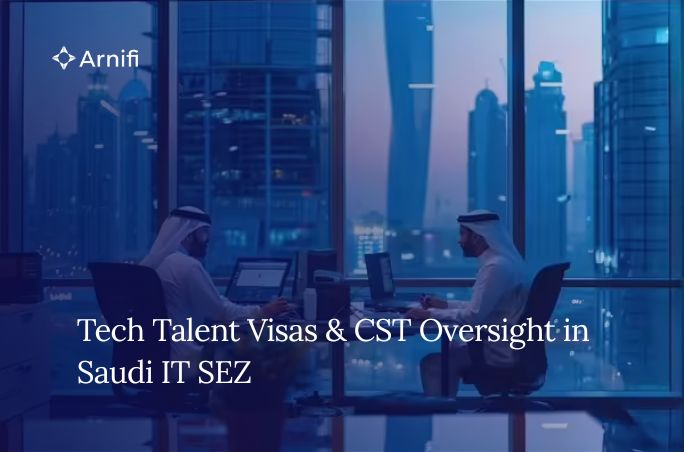Licensing Compliance in Saudi Arabia
by Shethana Dec 16, 2024  17 MIN READ
17 MIN READ

The Kingdom of Saudi Arabia has set up clear rules for business operations. These rules apply to both local and foreign companies. They include getting the right licenses and permits. This is to make sure businesses are honest, compete fairly, and follow the law in different industries.
The Saudi government is working hard to simplify these processes. One way they are doing this is by using digital platforms to make it easier for businesses. They also want to attract foreign investment. Companies that are already in the Saudi market or thinking of entering it need to carefully follow these regulatory requirements. It is important to keep up with changes in the laws, know the specific rules for different sectors, and get professional help when necessary. This will help businesses stay compliant and run smoothly in the Kingdom.
The Importance of Licensing for Businesses
Operating within the laws set by licensing rules is more than just a legal duty. It is a smart move for businesses in Saudi Arabia. This helps businesses seem trustworthy and gain respect from their customers, investors, and the government.
Following licensing requirements lets companies work without problems. This reduces the chances of legal troubles or interruptions in their work. These steps improve a company’s image and show a dedication to fair business practices. This can lead to better partnerships, more investments, and loyal customers.
Having a clear understanding of Saudi Arabia’s licensing rules can give businesses an advantage. It allows them to grab opportunities with confidence. They can focus on growing and expanding in the changing market of the Kingdom.
Recent Changes in Saudi Licensing Laws
Saudi Arabia is changing its rules to meet the goals of Vision 2030 and to fit into world market trends. In recent years, the licensing laws have gone through big changes. This shows that the Saudi government wants to create a better environment for businesses.
One important goal is to make things easier for foreign investors. They aim to reduce red tape and encourage investment in many different areas. There are now online platforms for applying for licenses, renewing them, and getting updates on regulations. This makes it simpler for businesses to move through the system.
These updates show how committed the Saudi government is to building a faster and more connected economy. It is important for businesses to stay on top of these changes. This way, they can adapt quickly, follow the rules, and take advantage of new opportunities when they appear.
Key Industries Affected by Licensing Regulations
Licensing rules in Saudi Arabia affect many different sectors. They help shape how businesses work in the Kingdom. These rules are important for growth and bringing in foreign investment. They also support economic diversification in key areas.
The sectors that feel the biggest impact from these licensing rules include energy, natural resources, technology, innovation, construction, and real estate. It is vital for businesses to know the specific licensing needs in these sectors. This knowledge is key for those who want to start or grow their business in Saudi Arabia.
Energy and Natural Resources Sector
Saudi Arabia is a global leader in energy production. The energy and natural resources area is key to its economy. To boost economic growth and reduce oil reliance, the Kingdom has made changes to attract foreign investment. It also wants to involve the private sector more.
The rules for getting licenses in this sector are strict. This shows how important these resources are. Companies that want to explore, extract, or produce energy must follow a detailed set of rules. They need to meet environmental standards and stick to specific licensing steps.
These rules are changing to encourage investment and grow renewable energy. The Saudi government is focusing more on sustainability. This is opening up new opportunities in the sector, with licensing processes moving toward a more varied energy mix.
Technology and Innovation Sector
Saudi Arabia wants to use technology and innovation to help its economy grow and change by 2030. The country is quickly moving towards digital transformation. There are many important investments in areas like artificial intelligence and machine learning.
The rules about licensing in this area are designed to help both new companies and established tech businesses. These rules make it easier to get licenses. They also create special economic zones that offer tax benefits and support entrepreneurship and innovation.
Data protection, cybersecurity, and intellectual property rights are also important in these licensing rules for businesses. Tech companies must keep up with these changing rules to seize the chances in Saudi Arabia’s developing tech scene.
Construction and Real Estate Sector
Saudi Arabia’s construction and real estate sector is growing fast. This growth comes from big infrastructure projects, an increasing population, and new rules about foreign ownership. The easing of some rules has opened the Saudi market to international investors. This creates new opportunities in commercial, residential, and industrial real estate.
Licensing rules in this sector aim to keep things clear, protect investors, and support sustainable development. Companies that want to work in this area must follow a detailed licensing process. They need to get permits for construction, land purchase, and property development while also sticking to building codes and zoning laws.
Knowing how these rules work is important, as they can change a lot between regions and types of projects. To get through the Saudi real estate market successfully, it’s helpful to work with local experts and legal professionals. They can guide you to get the right licenses and stay compliant during the entire project.
Understanding the Saudi Business Environment
To succeed in Saudi Arabia’s busy business environment, foreign investors need to know more than the legal rules. The Kingdom has a special culture with customs and traditions that greatly affect how people do business and make decisions.
It is important to build strong relationships, respect cultural differences, and show a commitment to ethical business practices. Doing these things helps build trust and create successful, long-lasting business relationships in Saudi Arabia.
Economic Landscape and Growth Prospects
Saudi Arabia’s economy is changing a lot. This change comes from Vision 2030, which aims to lessen the country’s reliance on oil money and build a more varied and smart economy. The Kingdom has started different economic reforms to attract foreign investment, support private sector growth, and create a better business environment.
Even with global economic challenges, Saudi Arabia has enjoyed a good annual growth rate over the past few years. This growth comes mainly from strong results in non-oil sectors like tourism, entertainment, logistics, and technology. This shows that the efforts to diversify the economy are working well.
The Saudi government’s emphasis on improving infrastructure, education, and skills in people’s careers opens up more chances for growth. These plans are meant to create a skilled workforce, draw in foreign talent, and make Saudi Arabia a key area for innovation and business ideas.
Cultural Insights for Business Success
Navigating Saudi business culture is key for creating successful, long-lasting business relationships. In Saudi Arabia, building trust and personal connections is very important. Knowing their cultural values can really affect how well business goes.
Meetings usually start with casual chats. This helps to build relationships before talking about business. It’s crucial to show respect when addressing Saudi partners. Use the right titles and be attentive during talks. Patience is also important, as making decisions can take some time.
Mutual respect and understanding are central to Saudi business culture. Companies that take the time to create strong relationships, show cultural awareness, and follow ethical business practices will find a friendly and rewarding place for growth and success.
Navigating Legal Frameworks for Compliance
Understanding and following the legal rules in Saudi Arabia is very important for any business. This helps create trust, good ethics, and steady growth. Main areas to focus on are corporate governance, intellectual property rights, and labor laws. These areas have changed quite a lot recently.
To succeed in the Saudi market, businesses must stay updated on these legal rules. It’s also key to work with trusted legal advisors and make compliance a priority from the start. This approach can help reduce risks and ensure success.
Corporate Governance Requirements
Strong corporate governance is very important. It helps to attract investment, build trust with others, and ensures that businesses in Saudi Arabia can last for a long time. The Kingdom has set strict governance standards that follow the best practices in the world. This is to encourage openness, responsibility, and good conduct in businesses.
Companies must create clear organizational structures. They should also set up strong internal controls and keep accurate financial reports. Rules often require that boards of directors include Saudi nationals. This is to make sure there is local knowledge and representation.
Following these corporate governance rules is not just about following the law. It is also a smart move for companies. It shows a commitment to being transparent and responsible. This can improve the company’s image and make it more appealing to investors, partners, and clients.
Intellectual Property Rights and Protections
Protecting intellectual property is very important for Licensing compliance in Saudi Arabia. The country has made its laws for IP protection stronger in recent years. This aligns with international standards and helps attract foreign investment while promoting innovation.
The Saudi Authority for Intellectual Property (SAIP) is in charge of granting and enforcing different types of IP protection. This includes patents, trademarks, copyrights, and industrial designs. Businesses must register their IP assets with SAIP. This way, they can secure legal protection and ensure their rights are defended.
It is crucial for businesses to understand the details of Saudi Arabia’s IP laws and regulations. They should also conduct careful due diligence and seek advice from IP professionals. By doing this, businesses can protect their innovations, stay ahead of the competition, and reduce potential risks.
Employment Law and Expat Workforce Regulations
Saudi Arabia has specific employment laws for hiring and managing expats. These laws help balance business needs with employee rights. The Ministry of Human Resources and Social Development (MHRSD) is important for regulating labor relations, setting minimum wages, and ensuring workplace safety.
When companies hire foreign workers, they must follow steps to get work visas. This includes making sure employees have the right permits and following rules about sponsorship transfers. The Saudization program (Nitaqat) encourages companies to hire Saudi nationals to boost local talent in the workforce.
Businesses need to know these laws and regulations. They must comply with contracts, payroll rules, and end-of-service benefits. Working with local HR experts or legal professionals can help navigate the challenges of Saudi labor law. This can create a positive and productive workplace environment.
Steps to Ensure Licensing Compliance
Ensuring that businesses meet licensing rules in Saudi Arabia’s changing regulatory landscape takes a plan and active work. It is important to build a culture of following the rules in the organization. This means not just getting licenses but also watching for updates in regulations and adapting to them.
Using best practices for due diligence is key. Getting expert legal help and using technology for compliance management are important steps. These efforts can help businesses lower risks, gain trust from stakeholders, and stay focused on their goals.
Conducting a Compliance Audit
A complete compliance audit for Licensing Compliance in Saudi Arabia is very important for businesses. It helps them see where they stand, find any gaps, and take action to meet Saudi Arabian licensing laws. This proactive method reduces the chance of fines, problems with operations, and harm to the company’s reputation.
Start by doing careful due diligence. Check all licenses and permits to make sure they are up to date. Look at how licenses are obtained, renewed, and tracked. Find any weak spots or areas that could be better. Compare what you currently do with best practices and the latest rules.
The results from the compliance audit will guide you on what changes to make. This will help improve internal controls and compliance processes. Showing you are following Saudi regulations builds trust with regulatory bodies and business partners.
Securing Necessary Licenses and Permits
Securing the right licenses and permits for Licensing Compliance in Saudi Arabia is key for following the rules in Saudi Arabia. This starts with knowing what your industry and business activities need.
The Ministry of Commerce and Investment (MCI) is the main place for many of the licensing processes. Still, depending on your industry, you may need additional approvals from other Ministries or government agencies. It is important to do thorough research or work with legal experts who know Saudi Arabia licensing well, to make sure you meet all the necessary requirements.
The application process for Licensing Compliance in Saudi Arabia usually requires you to submit detailed business plans and show your financial capability. You will also have to fulfill specific criteria for your industry, like technical qualifications or local ownership rules. Knowing how to manage the Saudi Arabia license system effectively is vital for starting and running your business smoothly.
Ongoing Compliance Monitoring and Reporting
Regulatory compliance in Saudi Arabia is something that businesses need to keep working on. They must stay updated about any changes in laws, regulations, and reporting rules. It is also important for them to regularly check and update their own internal processes to stay compliant.
To help with this, having a strong compliance monitoring system is a must. This system will help track license renewals, ensure reports are submitted on time, and keep up with any changes in regulations. Specific people in the company should be in charge of watching for regulatory updates, sharing information with others, and making any needed changes to policies and procedures.
Being proactive about compliance monitoring and reporting can help reduce the risk of penalties and disruption. It also helps create a culture of compliance within the company. This can improve its reputation and aid in achieving long-term success in the Saudi Arabian market.
Leveraging Technology for Compliance Management
As technology changes quickly, businesses in Saudi Arabia can take advantage of digital tools to improve how they manage compliance. Technology can help automate tasks and give updates right away. It makes understanding complex rules easier and can boost efficiency overall.
Using digital platforms and AI tools helps businesses stay organized. It reduces mistakes and allows them to concentrate on their main operations. They can have peace of mind knowing that their compliance needs are handled well.
Digital Solutions for Licensing Processes
The digital transformation happening in Saudi Arabia is changing how businesses handle their licensing. New technology is helping companies manage licenses better. They can now apply for licenses, track renewals, and keep records online.
Businesses can use online platforms with easy dashboards. These dashboards let them access information, send documents, pay fees, and chat with government offices electronically. These platforms connect to government databases, which helps with real-time updates and checks on license statuses. This reduces delays and increases accuracy.
Using these digital tools has many advantages for Licensing Compliance in Saudi Arabia. Automation minimizes paper use, lowers the chance of mistakes, and improves efficiency. It also helps businesses meet new regulatory requirements. Consequently, companies can spend more time and effort on their main operations, leading to growth and new ideas.
The Role of AI in Compliance Verification
Artificial intelligence (AI) and machine learning are becoming very important for checking compliance in Saudi Arabia. They bring higher efficiency and accuracy to businesses. AI tools can look at large amounts of data, find patterns, and spot issues that could mean compliance problems better than just doing it by hand.
These tools can also check documents automatically to make sure they meet certain standards. They can flag any problems for further checking. Machine learning algorithms can learn and get better over time, keeping up with changes in laws and finding compliance risks more accurately.
Using AI and machine learning Licensing Compliance in Saudi Arabia and management has big benefits for businesses. By automating boring tasks, improving accuracy, and giving useful insights to manage risks, AI helps companies stay compliant better. This saves time and resources, allowing them to focus on important goals.
Challenges and Solutions in Licensing Compliance
Navigating licensing compliance in Saudi Arabia can be tough for businesses, big or small. The rules keep changing, and each sector has its own needs and cultural aspects. This means companies must be smart and active about managing compliance.
By knowing the common problems, taking action before issues arise, and getting help from experts when necessary, businesses can handle these challenges. This helps them run smoothly and boosts their chances of success in the changing market of Saudi Arabia.
Common Compliance Issues Faced by Businesses
Licensing Compliance in Saudi Arabia could be simplified. Despite efforts to simplify processes, companies in Saudi Arabia often face similar compliance issues. It’s important to understand these problems to put in place preventive measures. This helps keep business operations running smoothly.
One common problem is keeping up with the country’s changing regulations. There are frequent updates to laws, so businesses need to stay alert. They should monitor changes and adjust their internal procedures. If they don’t, they might face penalties, delays, or disruptions.
Another challenge is correctly understanding and applying specific requirements for different industries. Each industry has its own licensing rules. Companies need to navigate these carefully to ensure that they meet all relevant standards and guidelines. Getting expert advice can really help reduce these risks.
Businesses that stay ahead of these trends, adapt their operations, and embrace a proactive approach to compliance will be best positioned to navigate the evolving regulatory landscape and capitalize on emerging opportunities.
In conclusion, understanding licensing rules in Saudi Arabia is very important for businesses to succeed. It helps to know the laws, cultural differences, and new rules being made. This knowledge is key for growth. Businesses can make their work easier by doing compliance checks, getting the right licenses, and using technology. Following the rules helps businesses grow and brings new chances in fields like energy, technology, and construction. Stay informed, be proactive, and adjust your plans to have a bright future in the Saudi Arabian business environment. For more tips on licensing compliance strategies, talk to our experts today.
Frequently Asked Questions
What are the first steps to achieve licensing compliance in Saudi Arabia?
The first steps are to do careful checks, learn about the legal rules for your industry, and find out what licenses and permits you need from Saudi authorities. Talking to legal experts who know about Saudi Arabia license management can give you helpful advice.
How has the Vision 2030 initiative impacted business licensing in Saudi Arabia?
Vision 2030 is making big changes to regulations. The goal is to attract foreign investment and encourage economic diversification. They are simplifying licensing processes. They are also setting up special economic zones. These changes aim to make a better business environment.
Also Read: Middle East Investors Favor Saudi Arabia for Private Debt Funds
About Arnifi
Arnifi is digital first Corporate service provider helping companies enter the Middle East region, starting with UAE and Saudi Arabia markets. Founded and backed by professionals from Amazon, Souq and other large companies operating in KSA – the team understands what it takes to succeed as a startup in both UAE and Saudi Arabian markets, apart from going through the setup process multiple times. Arnifi will provide a truly digital experience to entry and scale up of companies both UAE and Saudi Arabia. Discover tailored solutions and strategic partnerships that propel your business forward. Check out at – www.Arnifi.com for more details.
Also Read: Saudi Arabia issues 1,238 Premium Residency visas to attract investors.
For More details you can check out our products and offers here.
Top Saudi Arab Packages

Related Articles
Top Saudi Arab Packages



